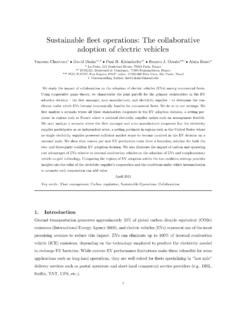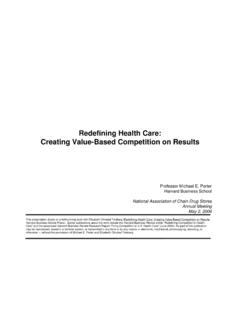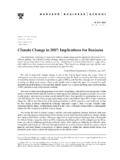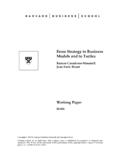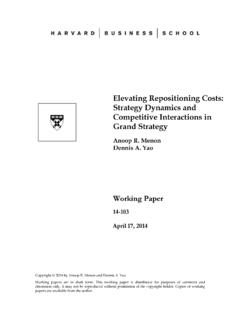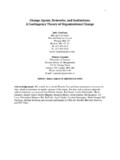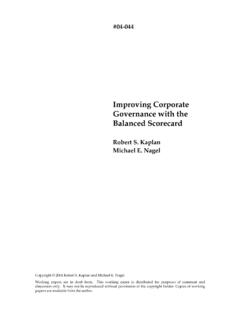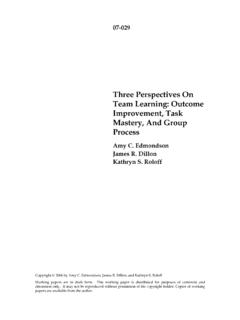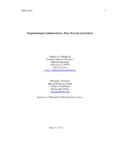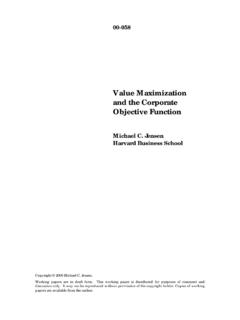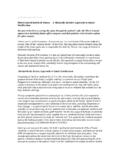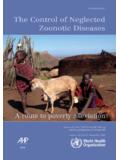Transcription of 12-065 2012-07-16-Learning from success and failure
1 Copyright 2012 by Diwas KC, Bradley R. Staats, and Francesca Gino Working papers are in draft form . This working paper is distributed for purposes of comment and discussion only. It may not be reproduced without permission of the copyright holder. Copies of working papers are available from the author. learning from My success and From Others failure : Evidence from minimally Invasive Cardiac Surgery Diwas KC Bradley R. Staats Francesca Gino Working Paper 12-065 July 19, 2012 learning from My success and From Others failure : Evidence from minimally Invasive Cardiac Surgery Diwas KC* Emory University 1300 Clifton Road NE Atlanta, GA 30322 Tel: 404-727-1424 Fax: 404-727-6313 Bradley R.
2 Staats University of North Carolina at Chapel Hill Campus Box 3490, McColl Building Chapel Hill, NC 27599-3490 Tel: 919-962-7343 Fax: 919-962-6949 Francesca Gino Harvard Business School Harvard University, Baker Library Boston, MA 02163 Tel: Fax: July 14, 2012 * Corresponding Author Acknowledgments We thank Mike Luca, Ella Miron-Spektor, Lamar Pierce, and Enno Siemsen for valuable comments on earlier drafts of the paper.
3 We are grateful to Jesper S rensen, the associate editor, and to the referees who provided constructive and developmental assistance throughout the review process. All errors remain our own. - 1 - learning from My success and From Others failure : Evidence from minimally Invasive Cardiac Surgery Abstract learning from past experience is central to an organization s adaptation and survival. A key dimension of prior experience is whether an outcome was successful or unsuccessful. While empirical studies have investigated the effects of success and failure in organizational learning , to date the phenomenon has received little attention at the individual level.
4 Drawing on attribution theory in psychology, we investigate how individuals learn from their own past experiences with both failure and success and from the experiences of others. For our empirical analyses, we use ten years of data from 71 cardiothoracic surgeons who completed over 6,500 procedures using a new technology for cardiac surgery. We find that individuals learn more from their own successes than from their own failures but learn more from the failures of others than from others successes. We also find that individuals prior successes and others failures can help individuals overcome their inability to learn from their own failures.
5 Together, these findings offer both theoretical and practical insights into how individuals learn directly from their prior experience and indirectly from the experiences of others. Key Words: failure , Healthcare, Knowledge Work, learning , Quality, Attribution theory 1. Introduction failure is simply the opportunity to begin again, this time more intelligently. Henry Ford It's fine to celebrate success but it is more important to heed the lessons of failure . Bill Gates The importance of failure in the learning process is well recognized by conventional wisdom as well as by the academic literature (Lapr and Nembhard 2010; Edmondson 2011).
6 Research on organizational learning has demonstrated that failure is central to both adaptation and change (Chuang and Baum 2003; Baum and Dahlin 2007; Kim and Miner 2007; Madsen and Desai 2010). failure is considered beneficial to learning since it draws attention to potential or real problems, and it stimulates the search for new strategies or approaches rather than the reinforcement of existing ones (Baum and Dahlin 2007; Chuang and Baum 2003). Although insightful, to date, this literature has primarily focused on why organizations fail to learn and on what strategies they can develop to learn effectively from failure over time (Haunschild and Sullivan 2002; Haunschild and Rhee 2004; Madsen and Desai 2010).
7 However, scholars and managers alike increasingly recognize that learning at the individual level is central to the understanding of organizational learning (Crossan, Lane and White 1999; Argote and Miron-Spektor 2011; Staats and Gino 2012). Despite its importance for organizational learning , the question of how individuals learn from failure , as compared to success , has received little empirical attention. Drawing on attribution theory in psychology (Ross and Nisbett 1991; Gilbert and Malone 1995), - 2 -in this paper we investigate how individuals learn from both failure and success .
8 We focus not only on individuals own past experiences, but also on how the experiences of others influence individuals own learning (Levitt and March 1988; Huber 1991; Miner and Haunschild 1995). Whether an individual s past experience resulted in a success or a failure is an important predictor of future performance, because each type of experience may result in varied levels of willingness for the individual to engage in different improvement activities. Prior research argues that success leads to local search that is, the refining of previous actions while failure leads to non-local search, or more substantial deviation from prior choices (Audia and Goncalo 2007; Baum and Dahlin 2007; Lapr and Nembhard 2010).
9 Through failure , an individual can learn what does not work and then develop and try a new approach to increase her likelihood of reaching a successful outcome in the future (Sitkin 1992; March and Simon 1993; Cannon and Edmondson 2005). This difference in how past experience is processed has led to theoretical work on the greater benefits that may arise from failure rather than success . While empirical work supports this view at the organizational level (Madsen and Desai 2010), the same may not be the case for individuals. Individuals, in fact, may interpret their prior experiences differently than do organizations.
10 While failure may be an important source of information for learning , we propose that individuals may not rely on it as much as they rely on success when evaluating their own prior experiences. We base this prediction on attribution theory, a psychological theory that suggests individuals tend to attribute their failures to external factors (thus not recognizing the role of their actions in such failures) and their successes to internal factors ( , their effort or ability) (Ross and Nisbett 1991; Gilbert and Malone 1995). One of the main assumptions of attribution theory is that people interpret their environment in a way that allows them to maintain a positive image of themselves ( , as competent and hard-working individuals, see Weiner 1974).
